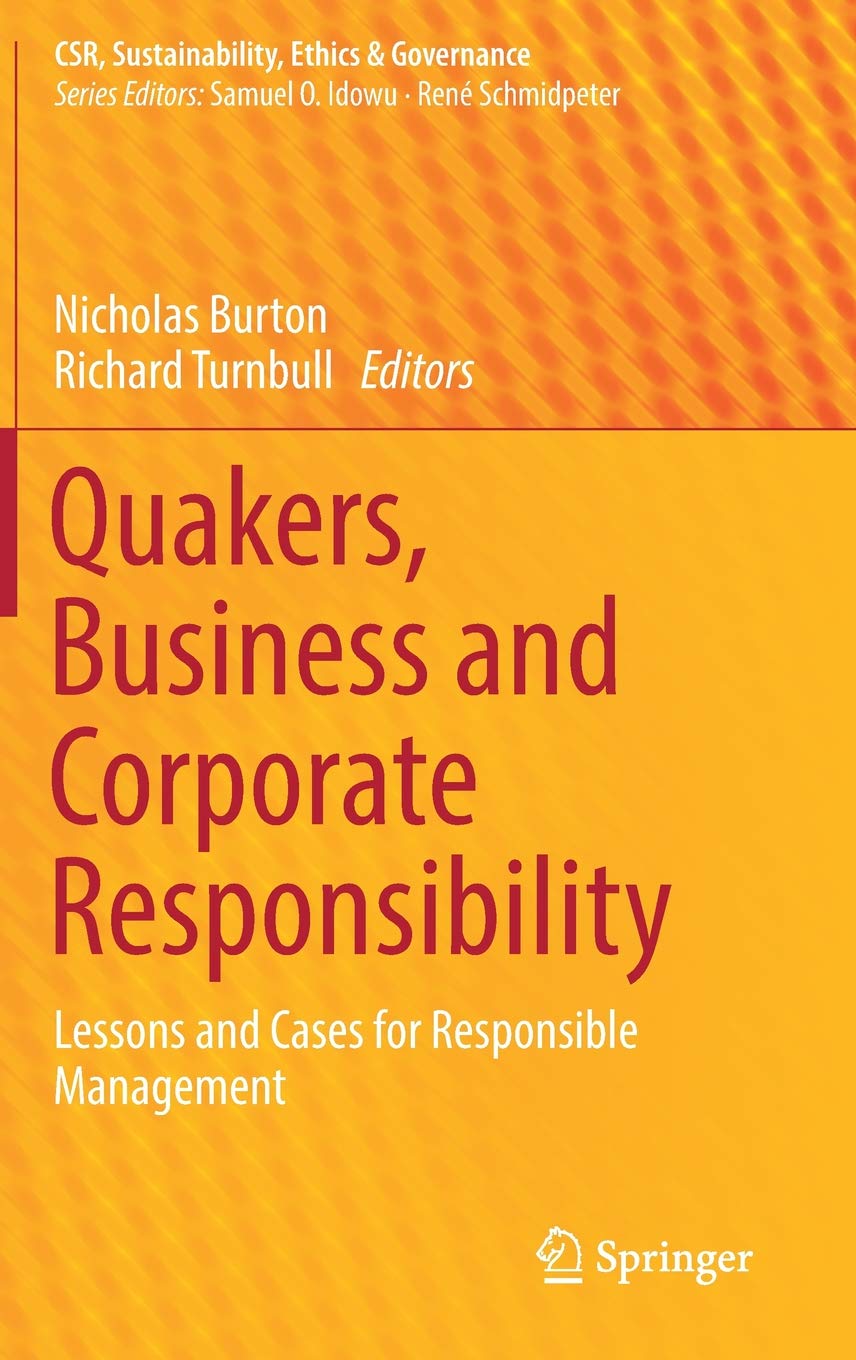Many books about business management or corporate responsibility use historical situations to illustrate or, at least to the satisfaction of their authors, prove their theories. Quakers, Business and Corporate Responsibility adopts the opposite approach: it examines a particular historical model of business management and corporate responsibility (that of the Quakers) and seeks to draw conclusions and raise questions that are of wider relevance.
It comprises a collection of essays relating to Quaker business practices and their economic and social views, which cover “topics that encompass both a historical and contemporary perspective” (page 1). In particular, as its sub-title (“Lessons and Cases for Responsible Management”) implies, it seeks to address the question, “What are the insights for responsible business practice that may interest contemporary scholars and practitioners?” (page 1).
This may suggest that the book will not interest less specialist readers. However, any such impression would be misleading. There is plenty in the book to engage any intelligent reader who is interested in business and social issues. Several of the essays deal with narrow subject areas (e.g. Karen Tibbals’s essay on the Quaker Employer Conference of 1918, Sue Kozel’s essay on Thomas Jefferson and Paul Anderson’s essay on John Bellers) but all of the essays, even those of limited scope, raise important issues of continuing relevance and most reward careful reading and thought. For example, Anderson provides fascinating insights into the origins of Karl Marx’s views (which may be of greater relevance today than most people would have expected or desired a few years ago).
Many of the authors are Quakers and, in a few places, one may question whether they have been sufficiently critical of the group to which they belong. However, overall the book succeeds in its aim of presenting “a sympathetic, but not uncritical view” (page 2) and, by admitting the difficulties experienced by Quaker businessmen and politicians, assisting in consideration of the problems that face business and society as a whole today.
Books comprising collections of essays by different authors are almost always of uneven quality and this one is no exception. It has obvious weaknesses. There are some simple inaccuracies, such as the statement by Donncha Kavanagh and Martin Brigham that the business innovations pioneered by Quakers include bills of exchange (page 113): medieval Italian bankers would disagree! There are also some overstatements, such as the assertion that the Quakers held “the pre-eminent position” in the commercial world for much of the eighteenth and nineteenth centuries (again in Kavanagh and Brigham’s essay, page 125) and the assertion that “Friends were far-sighted…. in anticipating centuries ago the importance of spirituality to every human being in all aspects of life including corporate life” (in Georgeanne Lamont’s essay, page 18): the pre-eminence of Quakers, whilst highly impressive, was in fact limited to certain business areas, such as banking and confectionary, and the application of spirituality to all areas of life was by no means a discovery of the last few centuries or one to which the Quakers can lay exclusive claim.
More seriously, whilst most of the essays proceed in a cautious and scholarly manner, carefully extracting tentative conclusions from their analysis, some appear to be squeezing the facts into a theory (e.g. Andrew Fincham’s competing values model, page 44) or drawing conclusions that relate only loosely to their analysis (e.g. Tibbals’s “Lessons for the Future”, page 75).
Some of the individual essays suffer from particular defects. In places, Lamont’s essay reads like an advertisement for her consultancy business, whilst Mike King, in his essay about the role of the state (“Honey I Shrunk the State”), self consciously presents his views as a middle course between extremes but defines those extremes (the views of Karl Marx and Milton Friedman, respectively) in such a way as to pre-determine a soft-left landing. He also fails to examine his unspoken assumption that the state can in fact deliver the benefits demanded of it (which history suggests it often cannot) and is prone to ex cathedra statements of a contentious nature (e.g. the statement that “The far-right libertarian assumes that the means of production can be conjured into existence by anyone if given sufficient freedom”, page 83; and his similarly unsupported statement that “the passage of time [has] endorsed the logic of Cadbury [i.e. an interventionist model] rather than Bright [i.e. a more free market approach]”, page 91).
Several of the essays also, rather irritatingly, assume that everyone agrees that “paternalism” (never defined) is a very bad thing without ever considering fairly the possibility that it was the right response to the conditions of the time. Fortunately, in his essay, Richard Turnbull spots this point and, in the context of his comments on voluntary societies, suggests that scholarly criticism of the power relationships, the paternalism and the guilt complexes of the middle class is unfair “not only because of a reading back of contemporary social values but also because it fails to recognise the real impact that such societies had” (page 106). As he then recognises, the spirit of this comment applies more generally to some of the criticism of Quaker businessmen.
Inevitably, the defects take some of the gloss off the book. However, it contains a considerable amount of fascinating and thought-provoking material. John Kimberley pithily and successfully rebuts the suggestion of Hobsbawm and Ranger that Quakerism is an ‘invented tradition’ and this paves the way for the essays that follow. Kavanagh and Brigham’s essay on “The Quakers and the Joint Stock Company”, despite the defects mentioned above, is particularly interesting. It provides a brief but fascinating overview of both Quaker contribution to business from the late seventeenth to the early twentieth centuries and of the history of the modern limited liability company. It should be of interest to anyone who would like to know a little more about these matters and to apply an historical perspective to challenge modern presuppositions about business organisation.
As might be expected of an essay from the Director of the Centre for Enterprise, Markets and Ethics, Turnbull’s essay, “Quakers, Free Trade and Social Responsibility”, performs a similar role. It begins by pointing out that there is “a conundrum” to be solved: Quaker businessmen “were compassionate employers with a genuine concern for their workforce” (page 106) yet Quakers opposed social legislation. For example, Joseph Pease and John Bright were among the leaders of the opposition to Ashley’s 1844 Factories Bill and (as King points out, page 82) Bright opposed legislation to combat food adulteration. Turnbull examines the beliefs and experiences of the Quakers, showing how these things may have led to the combination of paternalist concern and extreme libertarianism that was characteristic of Quaker thinking prior to the late nineteenth century. This leads to a conclusion that would have been suitable as a conclusion for the whole book: the Quaker businessman had many strengths; they “may not have been unique in [regard to their social concern], but that does not make them any less genuine” (page 106); some Quaker employers were more pioneering than others but, as a whole, they were among the pioneers of good employment practices; yet there were failures and blind spots of which “the most important one is the use of child labour in at least some Quaker factories against the increasingly prevailing national opinion” (page 107); more work needs to be done on specific companies but, overall, “We should neither condemn or whitewash” (page 107). We should learn!
“Quakers Business and Corporate Responsibility” edited by Nicholas Burton and Richard Turnbull was published in 2019 by Springer Nature Switzerland AG (ISBN – 13:978-3030-04033-8). 181pp.
Richard Godden is a Lawyer and has been a Partner with Linklaters for over 25 years during which time he has advised on a wide range of transactions and issues in various parts of the world.
Richard’s experience includes his time as Secretary at the UK Takeover Panel and a secondment to Linklaters’ Hong Kong office. He also served as Global Head of Client Sectors, responsible for Linklaters’ industry sector groups, and was a member of the Global Executive Committee.


